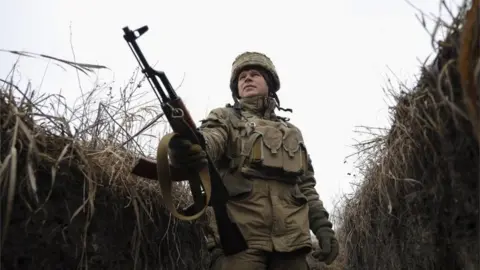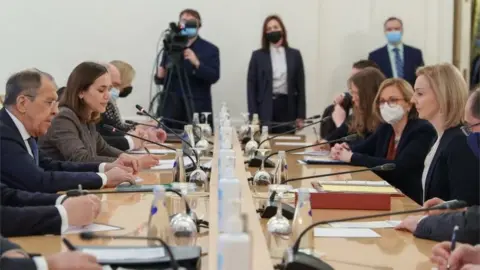Ukraine-Russia tensions: UK expands anti-Russian sanction powers
 EPA
EPANew powers will come into force on Thursday which give the UK the ability to expand sanctions against Russia, the Foreign Office minister has said.
James Cleverly told MPs it would "broaden the range" of Russian people and businesses the UK could target.
Currently, the government can only impose sanctions on those directly linked to Russian actions in Ukraine.
Labour expressed concern that MPs would not have the chance to debate the law before the parliamentary recess.
The House of Commons is closing on Thursday afternoon and will not reopen until 21 February.
The party's shadow foreign secretary David Lammy said MPs "deserved an opportunity to scrutinise the sanctions".
And his Labour colleague Chris Bryant said: "It's completely autocratic for government to publish legislation without any opportunity for anybody to scrutinise it, and frankly they have just been lazy. We're Johnny-come-latelies when it comes to sanctions in this area."
SNP MP Owen Thompson said his party wanted to be "constructive" but added: "Without seeing the legislation it is very, very difficult to be fulsome in the support that we might otherwise have wanted to be."
Mr Cleverly said he understood their "frustration" but promised the government was "moving at a pace" to ensure the expanded sanctions regime would be in place to "deter Russian aggression".
"This legislation will significantly broaden the range of people, businesses and other entities that we can sanction in response to any further Russian aggression," he said.
Last month, Foreign Secretary Liz Truss announced the government's intention to expand the powers and said the legislation would be in place by 10 February.
She said the law would not impose sanctions automatically but would provide additional powers "in the event of any further Russian incursion into Ukraine".
 EPA
EPARussia has called the threat of further sanctions "an undisguised attack on business" and warned it could take retaliatory measures.
Mr Cleverly's announcement comes as Russia and Belarus start 10 days of joint military drills close to the Belarusian border with Ukraine.
Russia has denied it has plans to invade Ukraine and Russia's Foreign Minister Sergei Lavrov has accused the West of "hysteria".
However, Prime Minister Boris Johnson warned that the situation was at its "most dangerous moment".
Mr Johnson has met the head of the Nato defence alliance Jens Stoltenberg in Brussels and is flying to Warsaw to meet the Polish prime minister Mateusz Morawiecki.
